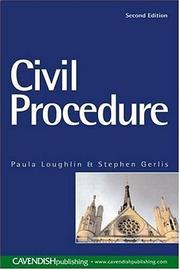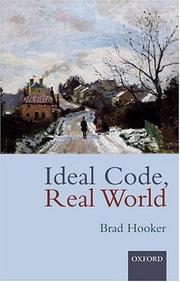| Listing 1 - 10 of 392 | << page >> |
Sort by
|

ISBN: 1859417752 9781135336165 1135336164 9781859417751 0735550077 1282376322 1283643847 9786612376320 1843145685 9781843145684 9781135336110 9781135336158 9781138147287 Year: 2004 Publisher: London Portland, Or. Cavendish Pub.
Abstract | Keywords | Export | Availability | Bookmark
 Loading...
Loading...Choose an application
- Reference Manager
- EndNote
- RefWorks (Direct export to RefWorks)
Civil Procedure provides an indispensable guide both to students of civil procedure at all levels as well as practitioners who regularly have to grapple with the CPR.
Civil procedure --- Court rules --- Rules of court --- Courts --- Procedure (Law)
Book
ISBN: 3110321742 9783110321746 3868380892 9783868380897 311031925X 9783110319255 9783868380897 9783110319255 Year: 2013 Publisher: Berlin Boston
Abstract | Keywords | Export | Availability | Bookmark
 Loading...
Loading...Choose an application
- Reference Manager
- EndNote
- RefWorks (Direct export to RefWorks)
The present book is a natural outgrowth of Rescher's longstanding preoccupation with the rational systematization of our knowledge as manifested in such earlier works as Cognitive Systematization (Oxford: Blackwell, 1979), and Complexity (New Brunswick: Transaction Publishers, 1998). Accordingly, the role of principles in human affairs is crucial and ubiquitous. Principology, the theory of principles-underdeveloped through it may be-is accordingly bound to find a significant place in the sphere of philosophical inquiry regarding matters of thought and action.
Principle (Philosophy) --- Rules (Philosophy) --- Philosophy

ISBN: 058536141X 9780585361413 0838934773 Year: 1998 Volume: no. [7] Publisher: Chicago : American Library Association,
Abstract | Keywords | Export | Availability | Bookmark
 Loading...
Loading...Choose an application
- Reference Manager
- EndNote
- RefWorks (Direct export to RefWorks)
Descriptive cataloging --- Social Sciences --- Library & Information Science --- Cataloging --- Rules --- Anglo-American cataloguing rules --- AACR 2 --- Anglo-American cataloging rules --- AACR2
Book
ISBN: 1613249489 9781613249482 9781608760695 1608760693 Year: 2010 Publisher: New York
Abstract | Keywords | Export | Availability | Bookmark
 Loading...
Loading...Choose an application
- Reference Manager
- EndNote
- RefWorks (Direct export to RefWorks)
Administrative agencies --- Administrative procedure --- Court rules
Book
ISBN: 3110321866 9783110321869 9783110321579 3110321572 9783868380859 386838085X 1299720501 Year: 2013 Publisher: Berlin Boston
Abstract | Keywords | Export | Availability | Bookmark
 Loading...
Loading...Choose an application
- Reference Manager
- EndNote
- RefWorks (Direct export to RefWorks)
The Rei(g)n of Rule is a study of rules and their role in language. Rules have dominated the philosophical arena as a fundamental philosophical concept. Little progress, however, has been made in reaching an accepted definition of rules. This fact is not coincidental. The concept of rule is expected to perform various, at times conflicting, tasks. Analyzing key debates and rule related discussions in the philosophy of language I show that typically rules are perceived and defined either as norms or as conventions. As norms, rules perform the evaluative task of distinguishing between correct and incorrect actions. As conventions, rules describe how certain actions are actually undertaken. As normative and conventional requirements do not necessarily coincide, the concept of rule cannot simultaneously accommodate both. The impossibility to consistently define 'rule' has gone unnoticed by philosophers, and it is in this sense that 'rule' has also blocked philosophical attempts to explain language in terms of rules.
Language and languages --- Rules (Philosophy) --- Philosophy --- Philosophy.
Book
ISBN: 1634637526 9781634637527 9781634637244 Year: 2015 Publisher: New York, [New York] : Nova Science Publishers, Inc.,
Abstract | Keywords | Export | Availability | Bookmark
 Loading...
Loading...Choose an application
- Reference Manager
- EndNote
- RefWorks (Direct export to RefWorks)
Administrative agencies --- Administrative procedure --- Court rules
Book
ISBN: 1617281980 9781617281983 9781606925553 1606925555 Year: 2009 Publisher: New York Nova Science
Abstract | Keywords | Export | Availability | Bookmark
 Loading...
Loading...Choose an application
- Reference Manager
- EndNote
- RefWorks (Direct export to RefWorks)
Parliamentary practice --- United States. --- Rules and practice.
Book
ISBN: 849444266X 9788494442667 Year: 2015 Publisher: [Barcelona] : JMB Bosch Editor,
Abstract | Keywords | Export | Availability | Bookmark
 Loading...
Loading...Choose an application
- Reference Manager
- EndNote
- RefWorks (Direct export to RefWorks)
Book
ISBN: 3830529996 9783830529996 9783830538349 Year: 2018 Publisher: Berlin
Abstract | Keywords | Export | Availability | Bookmark
 Loading...
Loading...Choose an application
- Reference Manager
- EndNote
- RefWorks (Direct export to RefWorks)

ISBN: 019825069X 0199256578 0191597708 128198924X 0191520268 9786611989248 9780198250692 9780191597701 9780191520266 6611989242 Year: 2000 Publisher: Oxford Clarendon
Abstract | Keywords | Export | Availability | Bookmark
 Loading...
Loading...Choose an application
- Reference Manager
- EndNote
- RefWorks (Direct export to RefWorks)
What are the appropriate criteria for assessing a theory of morality? This work begins by answering this question, and then argues for a rule-consequentialist theory in which acts should be assessed morally in terms of impartially justified rules.
Consequentialism (Ethics). --- Rules (Philosophy). --- Consequentialism (Ethics) --- Rules (Philosophy) --- Philosophy --- Ethics --- Utilitarianism
| Listing 1 - 10 of 392 | << page >> |
Sort by
|

 Search
Search Feedback
Feedback About UniCat
About UniCat  Help
Help News
News